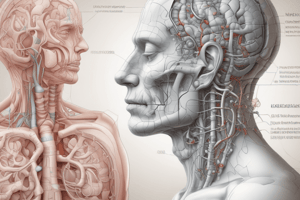Podcast
Questions and Answers
What does the term nas/o refer to?
What does the term nas/o refer to?
nose
What does the term rhin/o mean?
What does the term rhin/o mean?
nose
What does the term sinus/o indicate?
What does the term sinus/o indicate?
sinus, cavity
What does pharyng/o refer to?
What does pharyng/o refer to?
What is the meaning of laryng/o?
What is the meaning of laryng/o?
What does the term trache/o mean?
What does the term trache/o mean?
What does bronchi/o refer to?
What does bronchi/o refer to?
What does bronch/o indicate?
What does bronch/o indicate?
What does alveol/o signify?
What does alveol/o signify?
What is the meaning of pleur/o?
What is the meaning of pleur/o?
What does pneum/o refer to?
What does pneum/o refer to?
What does pulmon/o signify?
What does pulmon/o signify?
What does cyan/o mean?
What does cyan/o mean?
What is the meaning of steth/o?
What is the meaning of steth/o?
What does thorac/o refer to?
What does thorac/o refer to?
What does spir/o indicate?
What does spir/o indicate?
What does -osmia signify?
What does -osmia signify?
What is the meaning of -phonia?
What is the meaning of -phonia?
What does -pnea mean?
What does -pnea mean?
What does -thorax signify?
What does -thorax signify?
What does brady- refer to?
What does brady- refer to?
What does dys- indicate?
What does dys- indicate?
What does eu- mean?
What does eu- mean?
What does tachy- refer to?
What does tachy- refer to?
What is asthma?
What is asthma?
What does COPD stand for?
What does COPD stand for?
What is Influenza?
What is Influenza?
What is tuberculosis (TB)?
What is tuberculosis (TB)?
What does pneumonia refer to?
What does pneumonia refer to?
What is cystic fibrosis (CF)?
What is cystic fibrosis (CF)?
What does apnea mean?
What does apnea mean?
What is asphyxia?
What is asphyxia?
What does crackle refer to in medical terms?
What does crackle refer to in medical terms?
What is croup?
What is croup?
What is epiglottitis?
What is epiglottitis?
What does epistaxis refer to?
What does epistaxis refer to?
What is hypoemia?
What is hypoemia?
What does hypoxia mean?
What does hypoxia mean?
What is pertussis?
What is pertussis?
What does pleurisy refer to?
What does pleurisy refer to?
What is pulmonary edema?
What is pulmonary edema?
What does pulmonary embolism mean?
What does pulmonary embolism mean?
What does SIDS stand for?
What does SIDS stand for?
What does wheeze refer to?
What does wheeze refer to?
Flashcards are hidden until you start studying
Study Notes
Medical Terminology - Respiratory System
- nas/o: Refers to the nose; example includes nasal, meaning pertaining to the nose.
- rhin/o: Also denotes the nose; rhinoplasty is the surgical repair of the nose.
- sinus/o: Indicates sinus or cavity; sinusotomy is an incision of a sinus.
- pharyng/o: Relates to the pharynx or throat; pharyngoscope is an instrument used for examination.
- laryng/o: Refers to the larynx or voice box; laryngoplegia indicates paralysis of vocal cords.
- trache/o: Points to the trachea or windpipe; tracheoplasty refers to its surgical repair.
- bronchi/o: Denotes a bronchus; bronchiectasis means dilation of bronchi.
- bronch/o: Similar to bronchi/o; bronchoscope is an instrument for examining the bronchus.
- alveol/o: Pertains to the alveoli or air sacs; alveolar relates to them.
- pleur/o: Refers to the pleura; pleurocentesis is a surgical puncture of the pleural cavity.
- pneum/o: Relates to air or lungs; pneumonectomy is the excision of all or part of a lung.
- pulmon/o: Denotes the lung; a pulmonologist specializes in lung study.
- cyan/o: Refers to blue; cyanosis indicates an abnormal condition resulting in blueness.
- steth/o: Indicates the chest; stethoscope is an instrument for chest examination.
- thorac/o: Relates to the chest; thoracopathy describes a disease of the chest.
- spir/o: Refers to breathing; spirometer measures breathing capacity.
- -osmia: Relates to smell; anosmia indicates absence of smell.
- -phonia: Concerns voice; dysphonia means impaired voice.
- -pnea: Pertains to breathing; apnea denotes cessation of breathing.
- -thorax: Refers to the chest; pyothorax is pus found in the chest.
- brady-: Indicates slowness; bradypnea refers to slow breathing.
- dys-: Denotes difficulty; dyspnea entails difficult breathing.
- eu-: Indicates normalcy; eupnea refers to normal breathing.
- tachy-: Signifies rapid; tachypnea refers to rapid breathing.
- asthma: Condition that leads to spasms in bronchial passages, often causing dyspnea.
- COPD: Chronic obstructive pulmonary disease; includes respiratory disorders causing persistent airway obstruction.
- Influenza: Viral respiratory infection with acute symptoms.
- tuberculosis (TB): Communicable disease caused by bacteria, spreads through droplets.
- pneumonia: Inflammatory lung disease caused by various pathogens, including bacteria and viruses.
- cystic fibrosis (CF): Hereditary condition leading to the secretion of thick mucus from exocrine glands.
- apnea: Temporary loss of breath.
- asphyxia: Caused by insufficient oxygen intake.
- crackles: Abnormal sounds in respiration detected via auscultation.
- croup: Pediatric condition characterized by larynx, trachea, and bronchial inflammation.
- epiglottitis: Severe, potentially life-threatening infection of the epiglottis.
- epistaxis: Refers to a nasal hemorrhage, commonly known as a nosebleed.
- hypoemia: Indicates oxygen deficiency in arterial blood, a sign of respiratory impairment.
- hypoxia: Refers to oxygen deficiency in body tissues, also a sign of respiratory issues.
- pertussis: Known as whooping cough; is an acute infectious disease.
- pleurisy: Inflammation of the pleural membrane, resulting in sharp pain during breathing.
- pulmonary edema: Fluid accumulation in lung tissues, commonly due to heart failure.
- pulmonary embolism: Blockage in a lung artery caused by a mass, such as a blood clot.
- SIDS: Sudden infant death syndrome; unexpected death of a healthy infant.
- wheeze: A whistling sound caused by narrowed respiratory passageways.
- oximetry: Noninvasive method to measure hemoglobin oxygen saturation in blood.
Studying That Suits You
Use AI to generate personalized quizzes and flashcards to suit your learning preferences.




